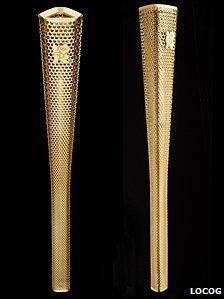Olympic torch design glows gold for London 2012
- Published
- comments
"We felt it should be something that's really beautiful and simple," says one of the designers, Jay Osgerby
The London 2012 Olympic torch will be a three-sided golden cone with the flame burning through its perforated shell.
The prototype, created by east London designers Edward Barber and Jay Osgerby, has been unveiled at St Pancras station.
Made from an aluminium alloy, it is light enough to be carried by young people who are expected to make up half of the 8,000 torchbearers.
The 70-day relay will take in most of the UK ahead of next year's Games.
It will start at Land's End on 19 May and travel 8,000 miles before arriving at the Olympic Stadium on 27 July for the lighting of the cauldron at the opening ceremony.
London 2012 organisers say the torch will come within an hour's travelling time of 95% of the UK population and thousands of people are expected to celebrate along the route, with shows and concerts planned on 66 of the 70 days.
Nominations, external are currently under way to find "inspirational" members of the public - many of them aged 12-24 - to carry the torch.
The torch has 8,000 laser-cut circular perforations, one for each torchbearer, in its double-skinned exterior.
The holes keep the weight down and allow onlookers to see the flame shining through the sides of the torch as well as rising from the top.
"We felt it should be something that's really beautiful and simple," said Jay Osgerby.
"But it had to feel like a functional object, a piece of sporting equipment like a baton" added Edward Barber.
Eight thousand of the 80cm tapering objects will be manufactured by Premier Sheet Metal of Coventry. They will be made from an aluminium alloy normally used for aeroplanes and cars.

The torch is made from two layers of laser-cut aluminium alloy
A burner, fuelled by a propane-butane gas canister, sits inside and will burn long enough for the torchbearer to run his or her allotted distance, on average 300 metres, before passing the flame to the next bearer's torch.
The flame will also be transported by vehicle between points on the relay.
The torch design will undergo weather testing at BMW's facility in Munich where it will be exposed to low temperatures, wind and rain.
London organising committee (Locog) chairman Sebastian Coe said: "The torch that carries the Olympic flame during the torch relay is one of the most recognisable and significant symbols of an Olympic Games.
"Members of the public right across the UK are busy nominating inspiring people to be torchbearers and I am thrilled we have a beautifully-designed, engineered and crafted torch for them to carry."
The origins of the Olympic torch relay look back to ancient Greece, when messengers were sent out from Olympia to announce the competition dates and call for a halt to all wars during the Games.
The relay was invented for modern times at the 1936 Berlin Games, and since then has grown into a popular curtain-raiser to the sporting events.
The design of the torch has changed with each Games, sometimes reflecting classical torches, at other times taking on a contemporary look.
For the modern Olympic Games, the flame is lit in Olympia from the Sun's rays using a parabolic mirror and then taken on a relay around Greece.
Unlike some previous relays, the 2012 torch will not go round the world.
At the end of the Greek tour, the flame will be taken straight to the UK.
Barber Osgerby won a competitive tender launched last year for the torch design role. They are also working on designs around the Paralympic torch relay.
- Published28 February 2011